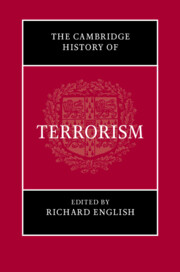Book contents
- The Cambridge History of Terrorism
- The Cambridge History of Terrorism
- Copyright page
- Contents
- Figures
- Tables
- Acknowledgements
- Contributors
- Part I Introduction
- Part II Frameworks and Definitions
- Part III Historical Case Studies in Terrorism
- Part IV Thematic Essays
- Part V Conclusion
- 26 Terrorism and History
- Index
- References
26 - Terrorism and History
Current Knowledge and Future Research
from Part V - Conclusion
Published online by Cambridge University Press: 07 May 2021
- The Cambridge History of Terrorism
- The Cambridge History of Terrorism
- Copyright page
- Contents
- Figures
- Tables
- Acknowledgements
- Contributors
- Part I Introduction
- Part II Frameworks and Definitions
- Part III Historical Case Studies in Terrorism
- Part IV Thematic Essays
- Part V Conclusion
- 26 Terrorism and History
- Index
- References
Summary
This book has involved scholars thinking historically about terrorism. In relation to the four main areas of understanding in the field – definition, causation, consequences and appropriate response - what can we therefore say that we know, and what should we prioritise next in our research? This chapter will identify some of what the contributors themselves have valuably argued, and it will consequently have a historical dimension. But it will also relate such ideas to wider understandings, findings and agendas, recognising that the study of terrorism is and should be collaborative between disciplines.
- Type
- Chapter
- Information
- The Cambridge History of Terrorism , pp. 647 - 671Publisher: Cambridge University PressPrint publication year: 2021

